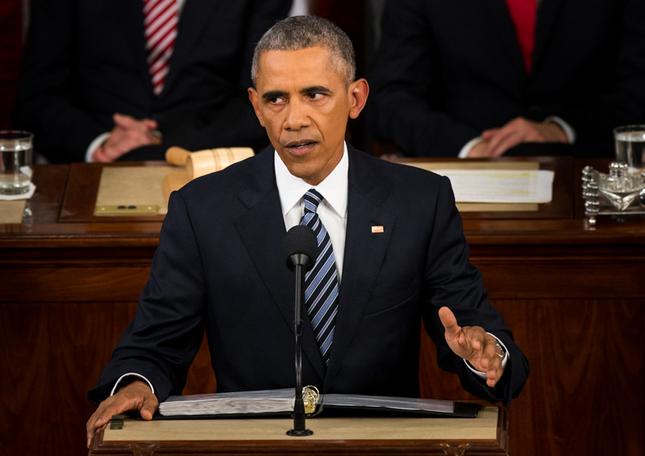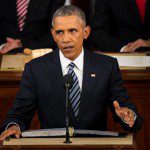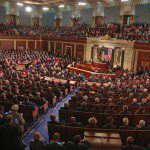Obama’s Last State of the Union: Stirring Valedictory
By • January 13, 2016 0 1510

Nothing exists in a vacuum. Not even, and especially, presidential State of the Union addresses.
President Barack Obama’s SOTU stood out in the context of—and in contrast to—other SOTU speeches, it was framed against the political atmosphere of the national presidential election race in which Republicans and Democrats are trying sometimes desperately to find a candidate around whom to rally. That fact alone made the House of Representatives chamber echo with a singular partisanship measured in applause or the lack of it.
The Jan. 12 speech at the U.S. Capitol came wrapped in character and expectations for it to be a kind of summing up, autumnal, and perhaps both stirring and resigned.
It came in the context of real time and real events out in the world, where the television media was already announcing a possible world crisis after Iran ships took control of two U.S. Navy boats which had accidentally moved in Iranian-controlled waters in the Persian Gulf. Predictably, several GOP candidates seized the opportunity to complain about the Obama administration-authored nuclear deal with Iran, which is anathema to the Republicans.
There was in Obama’s speech a flavor of both bravado and regret, and a warning, one surprisingly echoed by South Carolina Governor Nikki Haley, who had been chosen to give the GOP rebuttal speech.
The bravado came in Obama’s repeated claim that the United States was, in fact, economically surging and sound, that it was military strong and stronger than every other country in the world, that his health care legislation had hugely expanded care to millions not covered before and that there was reason to be optimistic about the future and proud of the accomplishments of his two terms.
Reactions to Obama’s claims depended almost exactly on where you were sitting—in the case of the members of Congress, quite literally. The smaller section housing the Democrat senators and representatives cheered loud and often throughout, the GOP section remained glumly and notably silent throughout except for at least one very singular exception.
At one point, the president said, “It’s one of the few regrets of my presidency that the rancor and suspicion between the parties has gotten worse instead of better. There’s no doubt a president with the gifts of Lincoln and Roosevelt might have better bridged the divide, and I guarantee I’ll keep trying to be better so long as I hold this office,” no small admission for a president noted for his rhetorical abilities.
He said that change and uncertainty had activated “a particularly virulent strain our politics.” “When politicians insult Muslims, whether abroad or our fellow citizens, when a mosque is vandalized or a kid bullied, that doesn’t make us safer. . . . That’s not telling it like it is. It diminishes us in the eyes of the world. It makes it harder to achieve our goals. It betrays who we are as a country.”
This brought some general applause and may have signaled, without calling him out by name, a risible rise against Donald Trump, whose consistently intemperate language and outrages on the campaign trail has fueled his rise to the GOP lead in the polls.
More surprisingly, that theme—about Trump, but not by name—was also echoed by Haley, who warned that Americans should “avoid the siren call of the angriest voices.” Haley’s voice was likely to be listened to since she came from a family of Indian immigrants to rise to the governorship of South Carolina, hardly a blue state.
Obama praised his “friend and partner,” Vice President Joe Biden, who flashed his big grin often and engaged in what seemed like comradely banter with the new and stern-faced Speaker of the House Paul Ryan. Obama announced a national effort to find a cure for cancer, to be headed by Biden, who lost his son Beau to the illness last year.
Talking about common values and common ground, Obama called for a halt to gerrymandering. He said that democracy “does require basic bonds of trust between its citizens. … We have to choose a system to reflect our better selves.” But he recognized the difficult of affecting change: “It won’t be easy. What I’m asking for is hard.”
The silence that greeted those comments from the GOP side, deep and consistent, shows just how hard it will be. It’s likely that Ryan won’t be much help if his posture behind the president is any indication. He applauded, very lightly, only about three times, two of them obligatory. He maintained a thin smile throughout, appearing to be above the fray and inscrutable, like a Cheshire Cat disguised as the Speaker of the House.
While Trump twittered that he found the speech “boring and lethargic,” Senator Ted Cruz, who is slightly ahead in the polls in the Iowa caucus, said ahead of the speech that he didn’t show up because he had “a Canadian curling contest to attend.” “I think the speech will be a series of acts of demagoguery,” he said.
Obama’s SOTU wasn’t anything like that. It seemed both troubling and urgent, even impassioned, because the political divide that took up a large part of the content of the speech was in the context of an atmosphere of apparently intractable division and rancor.
But perhaps there was progress of sorts. Nobody yelled “Liar!” from the GOP seats.
In addition, the latest word had it that the Iranians had released those 10 U.S. sailors.
- President Barack Obama at the U.S. Capitol during his State of the Union address Jan. 12. | Photo by Erin Schaff.



